Proposal vs. Contract: What's The Difference?
Not exactly sure what's the difference between a proposal and a contract? You're in the right spot! We explain what these documents mean for your business — in plain language, no fluff.
— Propoze
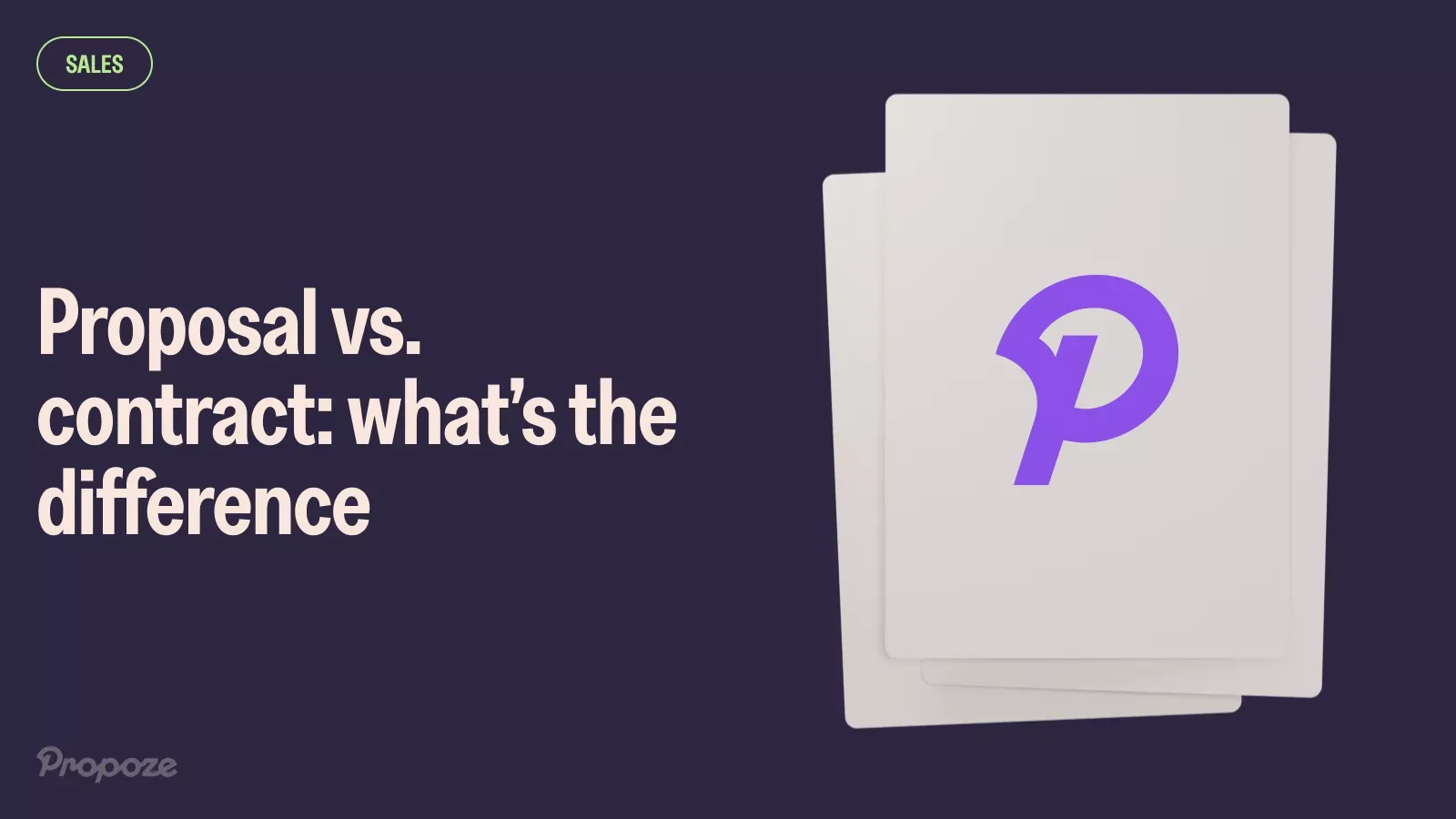
Are you wondering about the key differences between a proposal and a contract?
Understanding these essential documents, both a proposal and a contract, is crucial for protecting your business and avoiding costly misunderstandings. A proposal outlines your offer, showcasing why your clients should choose you.
It sets clear expectations about deliverables and pricing. On the other hand, a contract solidifies that agreement, legally binding both parties to the terms.
In this guide, we’ll dive deep into the proposal vs. contract debate, explore when to use each, and help you draft documents that protect your business.
Whether you’re sealing a deal or formalizing it, mastering proposals and contracts ensures smoother client relationships.
Understanding proposals and contracts
Proposals and contracts are two essential documents in the project planning process. A proposal is a document that outlines the scope of work, timeline, and budget for a project, while a contract is a legally binding agreement between two parties that outlines the terms and conditions of the project. Understanding the difference between these two documents is crucial for successful project planning and execution.
A proposal serves as the initial pitch, detailing what you can offer to a potential client. It includes the project scope, deliverables, timelines, and budget, providing a clear picture of what the client can expect.
On the other hand, a contract takes this a step further by formalizing these details into a legally binding agreement. This ensures that both parties are committed to the terms and conditions outlined, providing legal protection and clarity.
In essence, while a proposal is about showcasing your capabilities and setting expectations, a contract is about solidifying those expectations into a mutual agreement that is enforceable by law. Both documents are crucial in their own right, playing distinct yet complementary roles in the project planning process.
What is a proposal?
Think of a proposal as your business's first handshake with a potential client; it's a formal introduction and a pitch all rolled into one.
A proposal outlines what your business can do for the client, detailing the services or products you offer, and how they benefit the prospect.
Here's an example.
Imagine a digital marketing agency is approached by a mid-sized B2B software company that wants to improve its online presence and lead generation.
To initiate the partnership, the agency sends a detailed proposal outlining services like SEO strategy, content marketing, and paid advertising, along with estimated timelines and pricing for each service. This proposal helps the prospective client see a clear path to their goals while also establishing the agency's expertise and professionalism.
The B2B client can then review and discuss the proposal, making adjustments as necessary, before deciding to move forward.
The proposal is your chance to shine and show why you're the best fit for the job.
✅ Content — Services or products offered, benefits, and pricing
✅ Outcome — Aiming for a business agreement
Remember, a proposal is not a legally binding document; it's a starting point for negotiations. It's where you lay out the potential of a partnership, and if all goes well, it's the precursor to a contract.
Your proposal is your business's promise, a snapshot of what you can deliver. It's not just an outline; it's your first handshake with a prospective client, showing them what you're all about.
This really important stage is where you start building a mutual agreement, the road to a successful partnership you both aim for.
And creating a proposal without an appropriate tool isn't an easy task. Below is a handpicked list of the best proposal tools for freelancers and micro/small companies.
Needless to say, the easiest option is to create a free Propoze account and start creating those winning proposals in less than a few minutes!
Why do you need a proposal?
Think of a proposal as your business’s first impression; it’s your chance to show potential clients not just what you can do, but how you plan to achieve it. However, such a proposal cannot be legally binding if it lacks essential elements like mutual assent and consideration.
Proposals are your pitch, laying out the services or products you offer in a way that’s meant to persuade and inform.
They’re not just about selling; they’re about setting expectations and starting a relationship on the right foot.
- Sales proposals are essential for businesses to pitch products/services.
- Freelancers benefit from clear, concise proposals to close deals effectively and stand out professionally.
A well-crafted proposal can be the difference between landing a new client or watching them go to a competitor.
It’s your opportunity to demonstrate your understanding of their needs and how you intend to meet them.
Plus, a proposal can serve as a preliminary agreement, outlining the scope and terms before a formal contract is drawn up. Remember, your proposal is more than a document; it’s a strategic tool. Use it to clarify your value proposition and set the stage for successful negotiations.
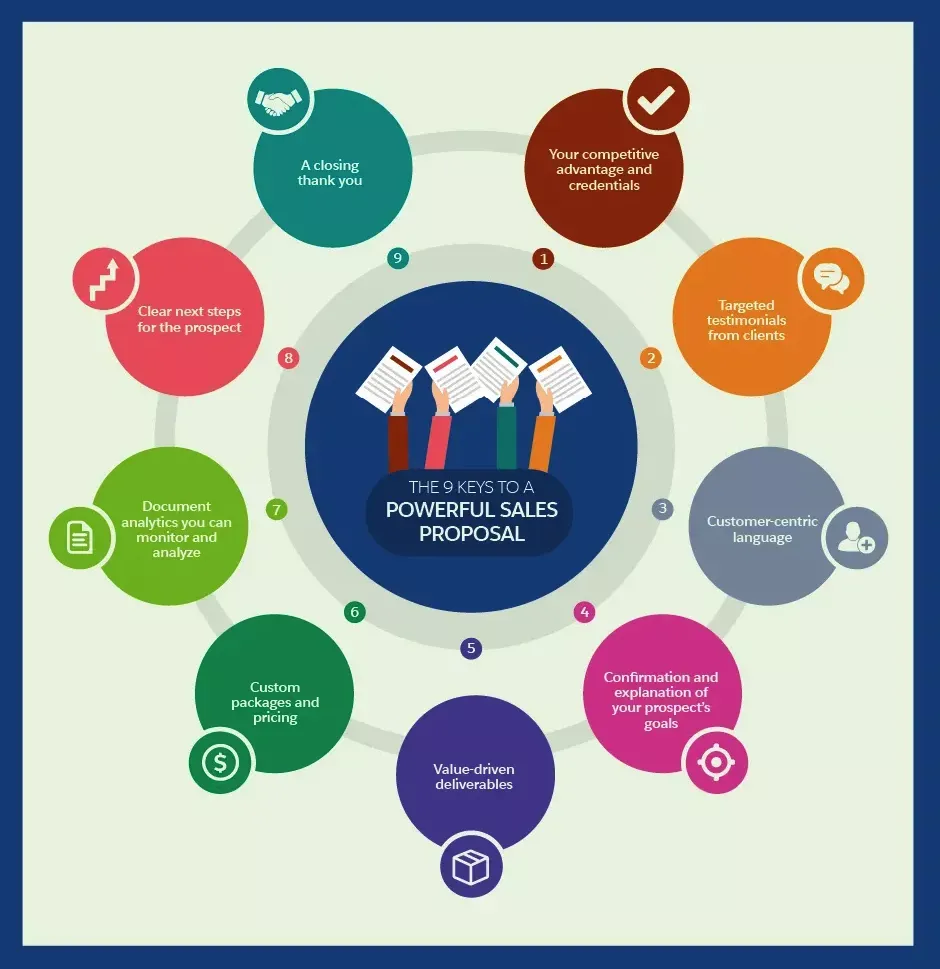
What goes into a proposal?
As a freelancer, your proposal is your pitch to clients, laying out exactly what they can expect from you. A clear proposal prevents misunderstandings and helps you win projects, turning it into a winning proposal.
📝 Project overview — Outline what you’ll deliver. For example, a freelance writer might offer blog posts, articles, or social media content, while a graphic designer might include logo creation or branding services.
✅ Deliverables — Specify the exact outputs. Example: "Deliver three logo concepts within two weeks."
🕐 Timeline — Define clear milestones. Let your clients know when to expect each deliverable.
💰Pricing structure & payment terms — Be upfront about costs. Clearly state if you charge a flat fee or hourly, and set payment terms (e.g., 50% upfront, balance upon completion). For instance, “This project costs $2,000, with half due at the start and the rest upon final approval.”
🔍 Scope of work — Avoid scope creep by detailing exactly what’s included — and what isn’t. If additional services are requested, specify that they will come at extra cost.
📄 Client responsibilities — Make it clear what you need from your client to meet deadlines, such as logos, files, or access to content platforms.
⏭️ Next steps — Once the proposal is approved, explain that you’ll move to a contract that formalizes the terms, protecting both sides legally.
What is a contract?
At its core, a contract is a promise that the law will enforce.
It's a binding agreement between two or more parties, each with obligations that are legally enforceable.
Think of contracts as a powerful asset for your business, especially when you're kicking off a new project.
They make sure that everyone involved in the project is clear about what they need to do and helps in contracting value from the deal.
Contracts come in various forms, and understanding the different types is crucial. For instance, a Valid Contract meets all legal essentials, including offer, acceptance, and consideration.
It's the gold standard of contracts, ensuring all parties are on the same page and the law backs the agreement.
But remember, a contract is a serious promise; breaking it can lead to legal issues.
1️⃣ Valid Contract: The whole package, legally binding and enforceable.
2️⃣ Void Contract: Lacks legal effect from the start, like an agreement based on an illegal act.
3️⃣ Voidable Contract: Valid until one party decides to cancel due to certain legal defenses.
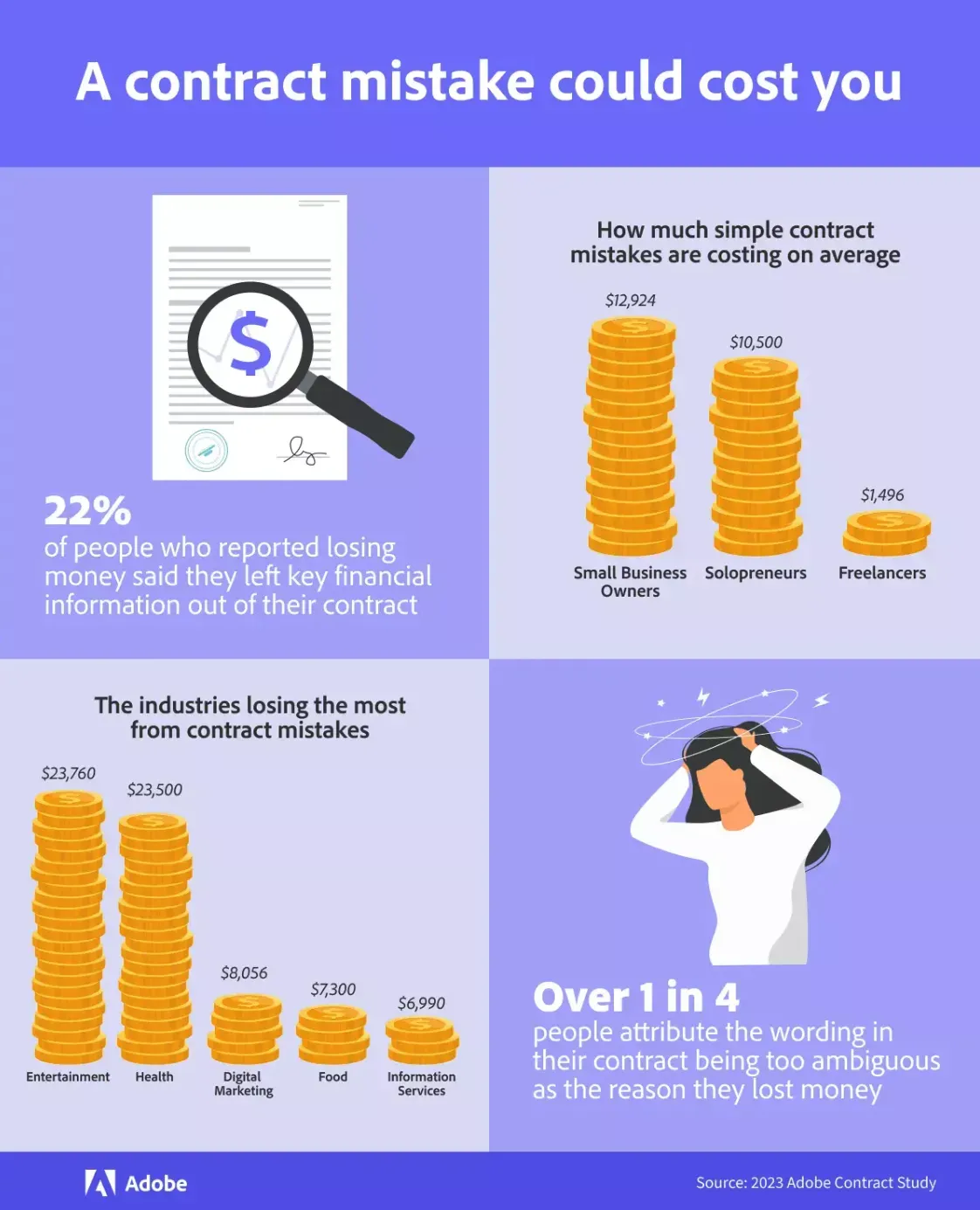
What goes into a contract?
When it comes to contracts, the devil is in the details.
Every contract should clearly outline the expectations and obligations of all parties involved.
This includes the offer, acceptance, and consideration, which are the bedrock of contract law.
When creating a formal contract, each element is vital to ensure the agreement is legally binding.
💰 Offer — One party presents terms or services to another. For example, a web designer offers to create a website for $3,000.
🤝 Acceptance — The other party agrees to the offer under the stated terms, either verbally or in writing. E.g., the client agrees to the web design project within the proposed timeline.
💱 Consideration — This refers to what each party will exchange. In most cases, it’s money for services. For example, the client pays $3,000 in exchange for the designer’s work.
💼 Capacity — Both parties must have the legal ability to enter into the contract. Minors or individuals under duress may lack this capacity.
⚖️ Legality — The contract’s purpose must be legal. A contract for an illegal activity is not enforceable.
A legal contract isn't just for show; it's a serious promise you're making. Make sure you double-check all the info and that everyone involved really understands what they're agreeing to.
Don't rush — make sure you're happy with everything before you sign that signed contract.
Whether you're dealing with a standard form or a custom agreement, never underestimate the power of negotiation. Create the contract to fit the project's needs and protect your interests.
To be more accurate:
Freelancers often face unpaid work. A clear contract can protect you by defining payment terms upfront, ensuring that you're compensated for every deliverable, such as monthly SEO reports or website development milestones.

Real-world example of a contract
Consider a freelance graphic designer who has been hired by a tech startup to create branding materials for a new product launch.
After the initial proposal is accepted, the designer provides a contract that includes specific terms to ensure clarity and security for both sides. This contract covers key elements such as project scope (logo design, social media graphics, and presentation templates), payment terms (an upfront deposit and milestone payments), deadlines, and a termination clause.
By signing the contract, both the designer and the client agree to the outlined conditions, ensuring the freelancer is compensated fairly and the client receives the promised deliverables on time.
In short, the contract helps prevent misunderstandings and provides legal recourse if either party fails to meet their obligations.
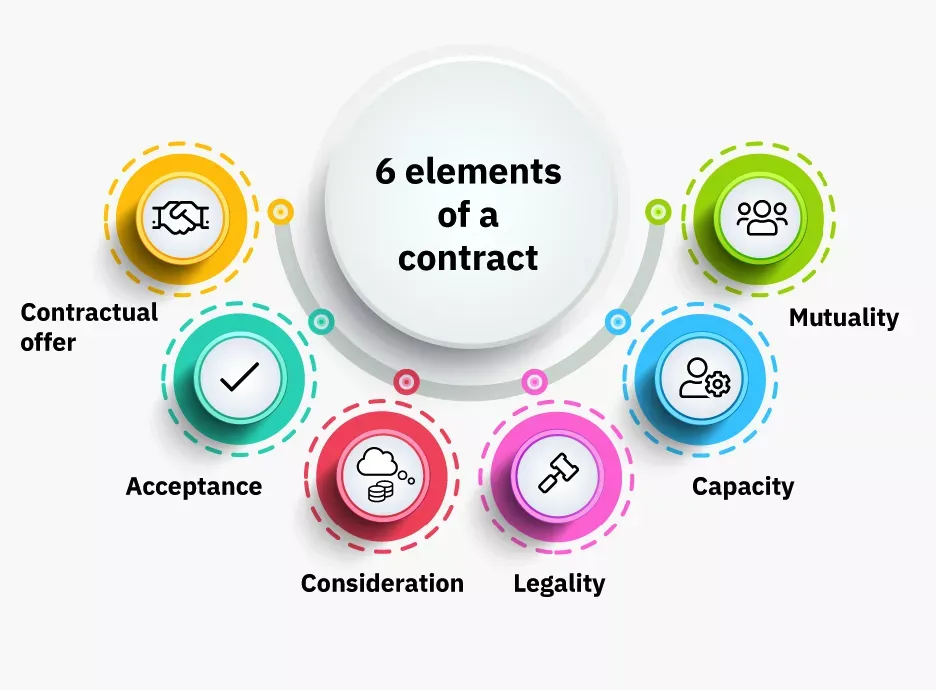
The role of proposals and contracts in project planning
Proposals and contracts play a vital role in project planning by ensuring that all parties involved are on the same page. A proposal outlines the project details, including the scope of work, timeline, and budget, while a contract formalizes the agreement between the parties involved.
By having a clear understanding of the project requirements and terms, both parties can work together to achieve the project goals.
When you present a proposal, you are essentially laying out a roadmap for the project. This document helps the prospective client understand what to expect, how long it will take, and how much it will cost.
It sets the stage for discussions and adjustments, ensuring that both parties have a mutual understanding of the project details.
Once the proposal is accepted, a contract is drafted to formalize the agreement. This legally binding document ensures that all parties are committed to the terms and conditions outlined in the proposal.
It provides a clear framework for the project, detailing the responsibilities of each party, payment schedules, and other critical terms.
This helps prevent misunderstandings and ensures that both parties are aligned in their expectations and obligations.
Getting on the same page
Getting on the same page is crucial for successful project planning and execution. A proposal and contract ensure that both parties have a clear understanding of the project requirements, timeline, and budget.
By having a mutual agreement on the project details, both parties can work together to achieve the project goals and avoid potential disputes.
A well-crafted proposal sets the foundation for this mutual understanding. It outlines the project scope, deliverables, timelines, and costs, providing a clear picture of what the client can expect. This helps in setting realistic expectations and facilitates open discussions about any adjustments needed.
Once the proposal is accepted, the contract formalizes these details into a legally binding agreement.
This document ensures that both parties are committed to the terms and conditions outlined, providing legal protection and clarity. By having a clear and mutual agreement on the project details, both parties can work together more effectively, reducing the risk of misunderstandings and disputes.
Proposals vs. contracts — what's the difference
Here's how proposals and contracts differ in purpose, function, and content.
What is their difference in purpose?
When it comes to proposal vs contract, it's crucial to understand that each serves a distinct role in the business process.
A proposal is your initial pitch.
It's where you outline what you can offer, the project scope, deliverables, timelines, and budget. Think of it as your opening move in a strategic game, setting the stage for what's to come.
On the flip side, a contract is the formal agreement that seals the deal.
It's the document that says, "We're in this together, and here's how it's going to work."
Contracts lay out the obligations, terms, and conditions that both parties have agreed to. It's your safety net, ensuring everyone's on the same page and legally bound to their promises.
To put it simply, a proposal is a suggestion, while a contract is a commitment.
Understanding the distinction between the two is not just about semantics; it's about recognizing the progression from a potential opportunity to a concrete partnership. Here's a quick rundown:
- Proposal: A document that asks another company to do business with you.
- Contract: A legal agreement that outlines the specifics of the business relationship.

How they work together?
When it comes to the nitty-gritty of business dealings, proposals and contracts are your financial armor.
They're more than just forms; they're your plan to prevent confusion and avoid expensive disagreements.
1️⃣ PROPOSALS lay out the initial terms and expectations. They're the blueprint of what's to come, detailing the scope, timeline, and cost. Think of them as a handshake agreement that sets the stage for formal negotiations.
2️⃣ CONTRACTS solidify those terms into a legally binding agreement. They're the nuts and bolts that hold the project together, ensuring everyone's on the same page. A well-drafted contract includes clear deliverables, payment schedules, and provisions for changes and extras.
By clearly defining the roles and responsibilities from the outset, proposals and contracts minimize the risk of financial disagreements. They ensure that both parties understand what's expected, reducing the likelihood of surprise costs or scope creep.
Remember, it's not just about having these documents; it's about making sure they're comprehensive and reflect the true intent of the business relationship.
So, when drafting your next proposal or contract, keep in mind the wise words from the Program on Negotiation at Harvard Law School: In contract negotiations, agree on how you'll disagree.
And after you've sent your proposal, there's a good chance you'll have to follow up with the client to get a positive response. Here's how to do it.
When to use a proposal vs. a contract?
As a freelancer, knowing when to use a proposal versus a contract can make all the difference. A proposal is great for outlining your services, project scope, and pricing during early discussions. It sets client expectations and helps you win the job.
Imagine you're a freelance web developer. You start by sending a proposal to a small business client looking to redesign their website. In this proposal, you outline the project's scope, costs, and timeline, including key milestones.
After the client reviews and accepts your proposal, you then draft a contract that finalizes these details. The contract includes essential clauses, like how many revisions are included and a clear payment schedule, which helps prevent scope creep and ensures you get paid on time.
This way, both parties are aligned, and you have legal backing for the agreed-upon work.
Similarly, if you're running a web development agency, a B2B proposal might outline services like website redesign, content management, and SEO for a corporate client.
This document allows the client to visualize your approach and decide whether your services meet their needs. Once they approve, you can move to a contract that covers confidentiality, intellectual property rights, and payment terms. This contract ensures accountability for both sides, making it clear what each party is responsible for and establishing legal protections for the work involved.
By knowing when and how to use each document, you can avoid unpaid work, manage client expectations, and build lasting client relationships. Using a proposal to start the conversation and a contract to formalize it provides a structured and secure workflow for your projects.
To help you out, let's compare proposal and contract.
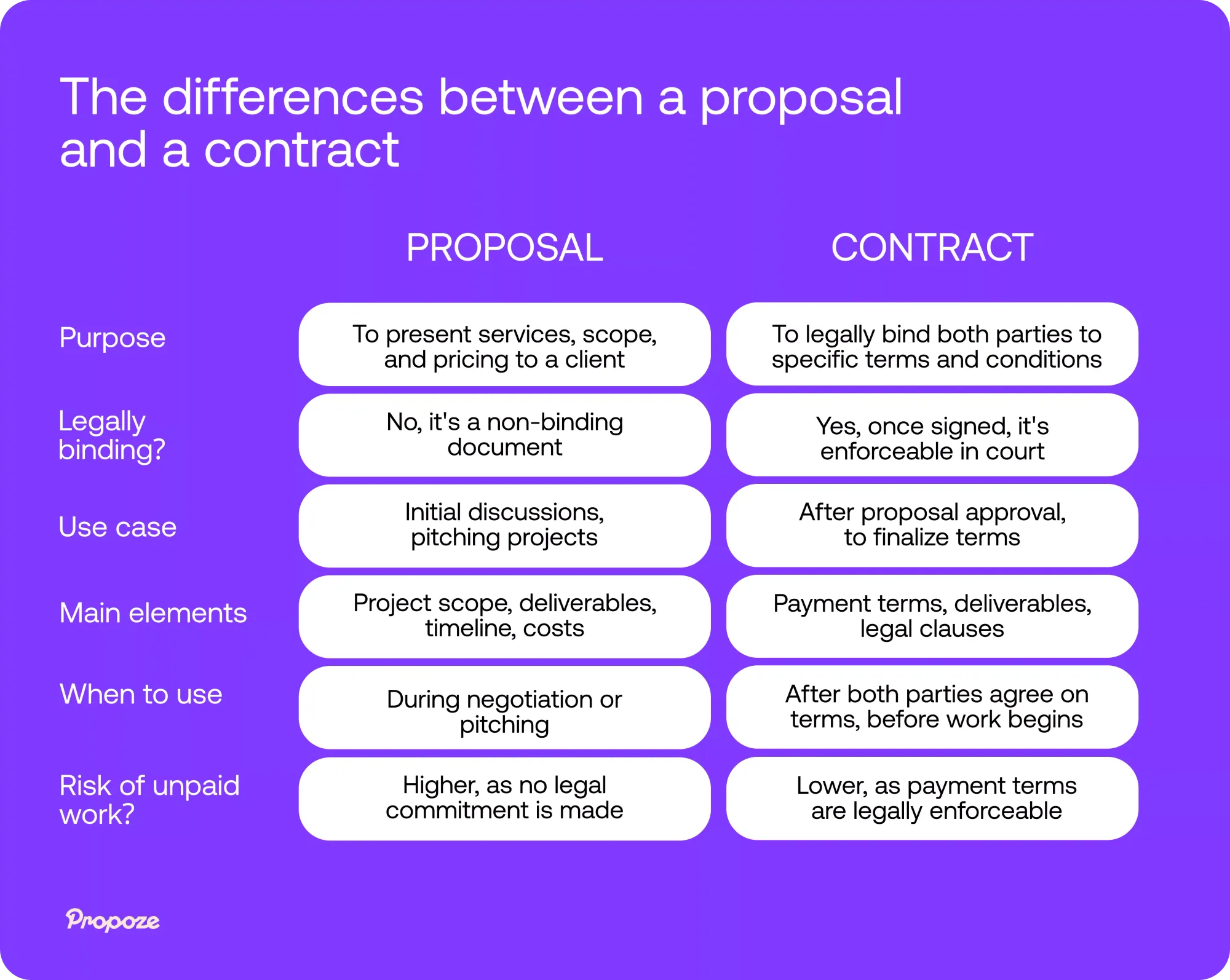
How contracts secure payment and protect both parties
Contracts are essential for securing payment, setting boundaries, and protecting you legally.
Let's explore the specific ways contracts offer financial security and clarity, especially for freelancers and small businesses.
1) Payment terms, upfront deposits, and financial disputes
Imagine this: a freelance designer accepts a job without setting payment terms, expecting full payment at the project's end. After delivering the work, the client delays payment for weeks.
To prevent such scenarios, contracts should clearly define payment terms.
- Upfront deposits: A standard deposit, often 30-50% of the project total, demonstrates commitment from the client and gives you immediate compensation. Specify the exact percentage and due date in the contract to avoid ambiguity.
- Milestone payments: For long-term projects, a contract can break down payment into phases tied to specific deliverables. For example, a web developer might set payments for “design mockup completion,” “website launch,” and “final revisions,” ensuring a steady cash flow and accountability throughout the project.
Pro tip: Specify in the contract the method of payment (e.g., bank transfer, online platforms) and any late fees. This removes uncertainty, so clients know exactly what to expect.
2) Scope clarity
Scope creep — clients requesting more work than initially agreed upon — is a common challenge. Contracts establish clear boundaries around the work to prevent this issue.
- Define project scope: Detail all deliverables, timelines, and what's not included. For instance, a content writer might specify a fixed number of revisions, word count limits, or topic areas.
- Additional requests: Outline a process for handling extra work, such as adding a new line item to cover additional services. This transparency prevents misunderstandings and keeps both parties aligned.
Example clause: “Any requests outside the agreed-upon scope, such as additional revisions or extra features, will be billed at a rate of $X per hour.” This ensures clients are aware of potential extra costs from the start.
3) Legal protection and termination clauses
Contracts also provide a safety net in case of disputes or unexpected issues. Including specific legal protections makes the contract enforceable and helps avoid conflicts.
- Termination clause: This clause defines how either party can end the agreement and what happens in such cases. For example, “Either party may terminate this contract with a 14-day written notice. In case of early termination, all completed work will be billed at the agreed-upon rate, and any outstanding payments will be due immediately.”
- Non-payment protections: Specify that ownership of the work remains with you until full payment is received. This clause ensures clients can't use the final product until you're paid.
Example: A photographer accepts a booking for a large event, with the contract including a termination clause that requires a 50% fee if the client cancels within two weeks of the event date. This clause protects the photographer from potential last-minute losses.

Transforming a proposal into a contract
You've written a proposals, the client is satisfied, and now is looking for you to send over a contract? The best thing to do here is – simply transform your proposal into a contract!
How to turn a proposal into a contract?
Turning a proposal is where you solidify your initial pitch into a binding agreement.
Start by ensuring all parties are crystal clear on the terms.
This means double-checking the details of the proposal and making sure they align with your client's expectations and your own capabilities.
- Review the proposal thoroughly, noting any areas that need clarification or adjustment.
- Negotiate terms that are fair and beneficial for both sides. Remember, this is a collaborative effort.
- Finalize the details and draft the contract, incorporating all agreed-upon terms.
- Obtain signatures from all parties involved to make it legally binding.
It's essential to include accurate owner information and a detailed payment schedule in the contract. These elements are the backbone of a legally binding document.
Always be prepared to negotiate the final contract terms. Don't rush into signing something that doesn't sit right with you.
The goal is to create a contract that reflects the true spirit of the proposal, ensuring a clear path forward for the project's delivery.
Here's a quick guide for creating contracts. Remember, this comes right after your sales proposal has been accepted.
Ensuring legal binding in your documents
To transform your proposal into a legally binding contract, it's crucial to dot the i's and cross the t's.
Start by clearly identifying the parties involved. Full legal names and contact information are a must to reduce any ambiguity. This isn't just a formality; it's the foundation of enforceability.
Remember, a contract is only as strong as its weakest link. Here's a quick checklist to keep you on track:
- Include all owner information, spelled correctly.
- Detail the obligations and liabilities of each party.
- Outline the resources and information required from each party.
- Establish a clear payment schedule.
By managing permissions, you control who can see and edit your documents. This isn't just about privacy; it's about maintaining the integrity of the contract throughout its lifecycle.
Finally, don't forget to have all parties sign the document. A signature is the seal that binds the agreement, making it official and enforceable. Without it, you're holding a proposal, not a contract.
And before you go and start creating your proposals and contracts, here's a great guide to follow! Check all the most common proposal mistakes and ensure your proposals are ironclad.
Most common questions about proposals and contracts
Here are some of the key questions — and answers you've been looking for.
Can a proposal be used as a contract
A proposal can be used as a contract if it includes legally binding terms and both parties sign it. However, typically, a proposal is more about outlining project details, while a contract formalizes the agreement.
Is proposal legally binding?
Proposals themselves are generally not legally binding, as they are intended to outline the project details and open discussions. They become binding if they are signed and contain terms that both parties agree to.
Is an RFP a contract?
No, an RFP (Request for Proposal) is not a contract. It’s a document requesting proposals from vendors or service providers to bid on a project. Contracts are signed only after an RFP response is accepted and terms are finalized.
Is a proposal the same as a tender?
No, a proposal is a document outlining project details and costs, usually created in response to a request. A tender is more formal and competitive, often used in government or corporate sectors for specific projects or services.
Is signing a proposal the same as signing a contract?
If a proposal includes legally binding terms and is signed by both parties, it can serve as a contract. However, it’s often best practice to create a separate contract document for legal clarity.
What makes a proposal valid?
A valid proposal should clearly outline the project scope, objectives, pricing, and terms. However, it only becomes enforceable if both parties agree and sign it, turning it into a contract.
Ready to simplify your proposals and contracts?
Stop wasting time on repetitive paperwork! With Propoze, you can quickly create professional, customizable proposals in just a few clicks.
Whether you're a freelancer or small business owner, Propoze helps you secure deals, protect your work, and build lasting partnerships.
Why wait? Start your free trial today and see how easy it is to manage proposals and contracts like a pro.
Let Propoze take care of the details, so you can focus on growing your business!